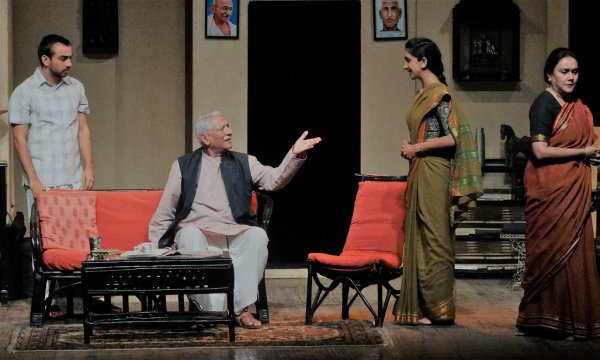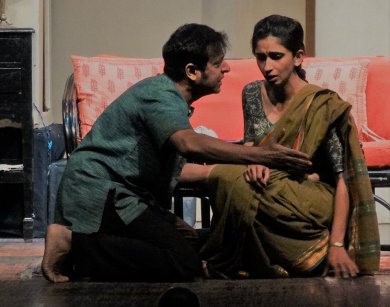 |
       |
 |
       |
The radical idealism Kanyadaan expresses has symbolic significance - Dr. S.D. Desai e-mail: sureshmrudula@gmail.com Photos courtesy: Tell Tale Productions March 8, 2019 Lillete Dubey's stage interpretation of Vijay Tendulkar's 1984 play Kanyadaan, significant for its analysis of a social issue, seen at the Tagore Memorial Hall, Ahmedabad, on Feb 27 (brought by Tell Tale) subtly and engagingly unravels varying textual layers ingrained. In a seemingly relaxed dialectical style with dramatic tension underneath she gets the playwright in conversation with the viewers, as it were. According a rapt quiet attention to the over two-hour long performance, the enlightened viewers, most of them elitist, had with him the focus on a puzzling contemporary issue of assimilating the country's large unprivileged population living on the fringe and suffering.  It was not 'a storm of hidden passions' that prompted the educated upper middleclass Brahmin girl Jyoti in her decision to marry Arun Athavale, essayed by Joy Sengupta, a Dalit who writes poetry and has been writing his autobiography. Brought up by parents having a socialist background and pretty much into social work, she seems to have made a decision that is more rational than romantic. A strong believer in a free individual will, Nath Dewalikar, an MLA, played with ease by Rajendra Gupta, feels elated by her decision which allows an experiment with a cause he champions. Deepika Amin's low-profile mother Seva finds the idea revolting and repugnant. Jyoti with her dyed-in-the-wool beliefs, a legacy she has received from father, would not budge. The consequences portrayed provoke collective thinking.  Arun's language and behavior are violent and uncivil, at times rude. Before marriage, he twists Jyoti's arm in her home to prove a point. Later he kicks her when she is pregnant. Much later, when success has gone to his head, he behaves arrogantly with her father and blackmails him. Nath, an upright man, gets blackmailed into praising Arun's autobiography in public though he regarded it as 'pulp fiction' because it was not a true account. He could be blackmailed because he loved his daughter and desired her life to be 'a little more tolerable'. The man who could walk tall and always smile turns a vulnerable, pathetic figure towards the end. Whenever Nath gets the better of the rude shock, ironically, he is likely to reassert as indeed he feebly says even in a state of disillusionment, 'Not all Dalits can be like that. They know what suffering is.'  Lillete Dubey Before the disillusionment prompted by emotions comes over him, Nath has attributed 'rough edges' in Arun's behaviour to his environment and violence in his language to the legacy of the community's simmering outrage against perpetuating social injustice. Mother Seva, like father Nath, has fought untouchability all her life. She did not readily consent to her marriage as her concern was that brought up in a different specific culture, she won't be able to handle the new situation of living in a scavenger's family. And yet, look how Tendulkar ends his play! Nath is remorseful that Jyoti had taken his 'words for gospel truth' and embraced his humanism and liberalism. In the culminating scene, Jyoti storms in to 'reprimand' her father for having forsaken his values, his uprightness, the cause he had held dear to his heart. 'Arun gave me,' she asserts 'what you had withheld from me' - the truth that man and his inherent nature are inseparable. Arun in her perception is both, the beast and the lover, the demon and the poet. She is in a hurry to get on with the struggle. Radically transformed, she declares she is an untouchable. Mrinmayee Godbole's Jyoti grows tall when with the strength of conviction she speaks, ironically and poignantly, a polished version of the language of the community, 'Fly from my shadow... my fire will scorch your comfortable values.' The kanyadaan Jyoti has snatched from her father is the legacy of his humanism. In the same idealistic vein one can say that the privileged section of society gives its enlightened daughter away for the larger good of the other section and the society at large. Vijay Tendulkar's radical idealism, portrayed pretty well on stage by Lillete Dubey, can be construed as symbolic of the sacrifices those privileged in society have to be prepared for. Dr. S.D. Desai, a professor of English, has been a Performing Arts Critic for many years. Among the dance journals he has contributed to are Narthaki, Sruti, Nartanam and Attendance. His books have been published by Gujarat Sahitya Academy, Oxford University Press and Rupa. After 30 years with a national English daily, he is now a freelance art writer. |